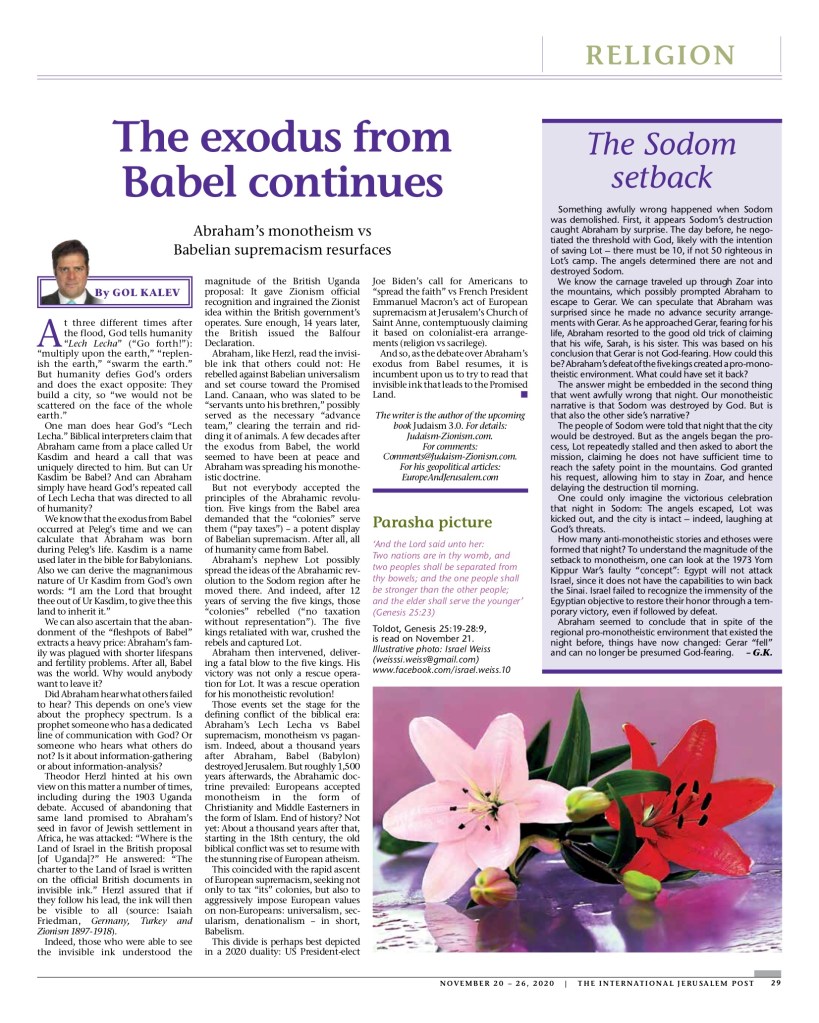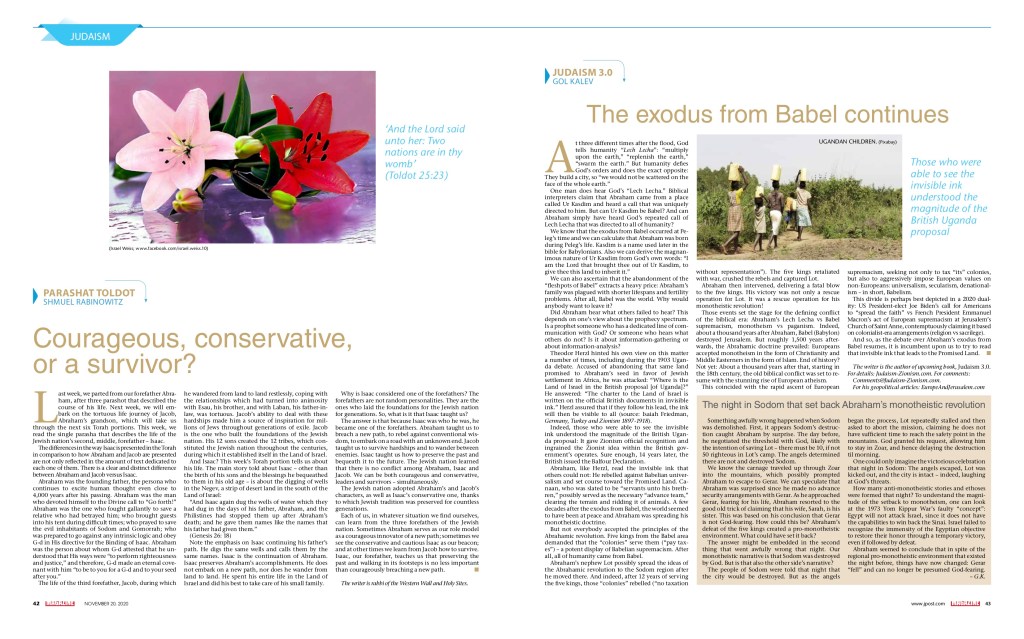Abraham’s monotheism vs Babel’s SUPREMACISM resurfaces
REPRINTS FROM THE JERUSALEM POST; BY GOL KALEV, november 18, 2020

At three different times after the flood, God tells humanity “Lech Lecha”: “multiply upon the earth,” “replenish the earth,” “swarm the earth.” But humanity defies God’s orders and does the exact opposite: They build a city, so “we would not be scattered on the face of the whole earth.” One man does hear God’s “Lech Lecha.” Biblical interpreters claim that Abraham came from a place called Ur Kasdim and heard a call that was uniquely directed to him. But can Ur Kasdim be Babel? And can Abraham simply have heard God’s repeated call of Lech Lecha that was directed to all of humanity?
We know that the exodus from Babel occurred at Peleg’s time and we can calculate that Abraham was born during Peleg’s life. Kasdim is a name used later in the bible for Babylonians. Also we can derive the magnanimous nature of Ur Kasdim from God’s own words: “I am the Lord that brought thee out of Ur Kasdim, to give thee this land to inherit it.” We can also ascertain that the abandonment of the “fleshpots of Babel” extracts a heavy price: Abraham’s family was plagued with shorter lifespans and fertility problems. After all, Babel was the world. Why would anybody want to leave it?
Did Abraham hear what others failed to hear? This depends on one’s view about the prophecy spectrum. Is a prophet someone who has a dedicated line of communication with God? Or someone who hears what others do not? Is it about information-gathering or about information-analysis?
Theodor Herzl hinted his own view on this matter a number of times, including during the 1903 Uganda debate. Accused of abandoning that same land promised to Abraham’s seed in favor of Jewish settlement in Africa, he was attacked: “Where is the Land of Israel in the British proposal [of Uganda]?” He answered: “The charter to the Land of Israel is written on the official British documents in invisible ink.” Herzl assured that if they follow his lead, the ink will then be visible to all (source: Isaiah Friedman, Germany, Turkey and Zionism 1897-1918).
Indeed, those who were able to see the invisible ink understood the magnitude of the British Uganda proposal: It gave Zionism official recognition and ingrained the Zionist idea within the British government’s operates. Sure enough, 14 years later, the British issued the Balfour Declaration.
Abraham, like Herzl, read the invisible ink that others could not: He rebelled against Babelian universalism and set course toward the Promised Land. Canaan, who was slated to be “servants unto his brethren,” possibly served as the necessary “advance team,” clearing the terrain and ridding it of animals. A few decades after the exodus from Babel, the world seemed to have been at peace and Abraham was spreading his monotheistic doctrine.
But not everybody accepted the principles of the Abrahamic revolution. Five kings from the Babel area demanded that the “colonies” serve them (“pay taxes”) – a potent display of Babelian supremacism. After all, all of humanity came from Babel.
Abraham’s nephew Lot possibly spread the ideas of the Abrahamic revolution to the Sodom region after he moved there. And indeed, after 12 years of serving the five kings, those “colonies” rebelled (“no taxation without representation”). The five kings retaliated with war, crushed the rebels and captured Lot.
Abraham then intervened, delivering a fatal blow to the five kings. His victory was not only a rescue operation for Lot. It was a rescue operation for his monotheistic revolution!
Those events set the stage for the defining conflict of the biblical era: Abraham’s Lech Lecha vs Babel supremacism, monotheism vs paganism. Indeed, about a thousand years after Abraham, Babel (Babylon) destroyed Jerusalem. But roughly 1,500 years afterwards, the Abrahamic doctrine prevailed: Europeans accepted monotheism in the form of Christianity and Middle Easterners in the form of Islam. End of history? Not yet: About a thousand years after that, starting in the 18th century, the old biblical conflict was set to resume with the stunning rise of European atheism.
This coincided with the rapid ascent of European supremacism, seeking not only to tax “its” colonies, but also to aggressively impose European values on non-Europeans: universalism, secularism, denationalism – in short, Babelism.
This divide is perhaps best depicted in a 2020 duality: US President-elect Joe Biden’s call for Americans to “spread the faith” vs French President Emmanuel Macron’s act of European supremacism at Jerusalem’s Church of Saint Anne, contemptuously claiming it based on colonialist-era arrangements (religion vs sacrilege).
And so, as the debate over Abraham’s exodus from Babel resumes, it is incumbent upon us to try to read that invisible ink that leads to the Promised Land.
The writer is the author of upcoming book, Judaism 3.0. For details: Judaism-Zionism.com. For comments: Comments@Judaism-Zionism.com.
For his geopolitical articles: EuropeAndJerusalem.com
This article first appeared in the november 20,, 2020 Jerusalem Post magazine as well as in the November 20, 2020 jerusalem post International Edition (click to expand):


More articles linking Torah & Zionism: Parasha & Herzl
More geopolitical articles: Europe & Jerusalem
Related Jerusalem Post articles by Gol Kalev:
To Egypt or to Israel? – Both Herzl and Joshua & Caleb understood what establishment Israelite leadership of their respective time did not – the exodus from Egypt/Europe is the return to Judaism even before it is the return to the land of the Jews.
The inauguration of Judaism 1.0 – The Temple was the point-of-orientation for Judaism When the Romans destroyed the Temple, they destroyed Judaism’s anchor. Yet, Judaism did not evaporate. Instead it transformed, adopting a new anchor – Rabbinical Judaism, centered around Halacha (Jewish Law), the canonization of the Oral Torah and the yearning to return.
Jewish transformation – Judaism 3.0 – For 2,000 years of exiles Judaism was bound by internal glue of religiosity and external one of insularity. With the radical decline in religious observance and elimination of outer walls, once again, Judaism has lost its anchor. But at the same time a new one emerged – Zionism, which is now turning into the organizing principle of Judaism.
European Actions Hurt Palestinians and Block Peace – From 1920 Tel-Chai events till today, Europe marks a century of debilitating interference in Isarel-Palestinian affiars.
more by Gol Kalev on EuropeandJerusalem.com, including:
European hijacking the Palestinian cause
European opposition to the Jewish state
Europe should benefit from Herzl’s vision
The resurfacing of European Colonialism
WATCH GOL KALEV AND ALIZA LAVIE DISCUSS HERZL’S LEGACY. SPECIAL GREETINGS BY PRESIDENT REUVEN RIVLIN
Get updates on Gol Kalev's upcoming book: Judaism 3.0
For inquiries and comments, please email: info@europeandjerusalem.com